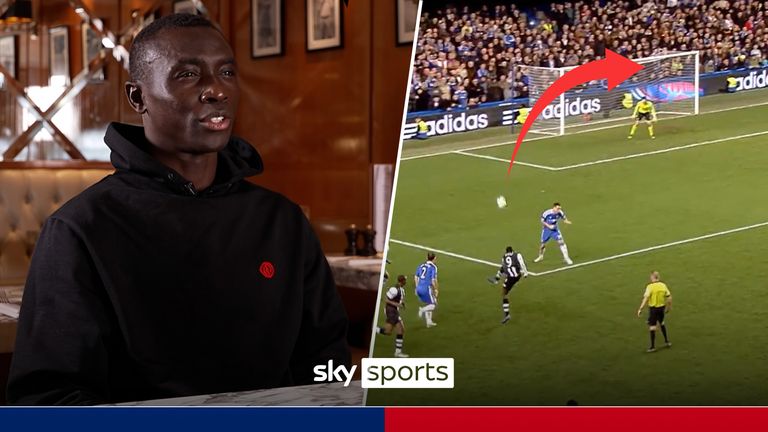In an exclusive interview, Papiss Cisse reflects on his wonder goal at Stamford Bridge, Didier Drogba’s stunned reaction and his time on Tyneside; watch Chelsea vs Newcastle live on Sky Sports Premier League from 1pm on Sunday, kick-off 2pm.

Ahead of Chelsea vs Newcastle, Papiss Cisse talks Sky Sports through his breathtaking brace against the Blues back in May 2012.
“Where you come from?!”
Papiss Cisse laughs as he remembers what Didier Drogba said to him after his famous goal at Chelsea for Newcastle in 2012.
Drogba wasn’t the only person stunned and wondering how Newcastle’s new No 9 was making such an incredible impact in the Premier League.
Cisse’s double on that May day at Stamford Bridge took his tally to 13 goals in his first 12 appearances for Newcastle, having joined from Freiburg in the January window.
After his impressive opener, Cisse’s stunning second – swerving the ball wickedly over Petr Cech from wide on the left touchline with the outside of his right boot – left everyone wanting to know more about this sensational Senegal striker.

We take a look back at Papiss Cisse’s greatest goals from his time in the Premier League with Newcastle United, including screamers against Chelsea, Southampton and more!
The calibre of the opposition made that goal-of-the-season strike even more special. Cech, John Terry, Branislav Ivanovic and co would go on to win the Champions League at the end of the season.
“If you see the backline of Chelsea, you’re going to say in your mind, ‘how are you going to get a goal?’ You’re watching them on the TV and now you’re in front of them,” says Cisse, sitting down to reflect on the game with Sky Sports before Sunday’s latest instalment of the fixture.

Papiss Cisse reflects on his wondergoal for Newcastle against Chelsea as the teams prepare to meet again at Stamford Bridge live on Sky Sports on Sunday
- Do Newcastle have a finishing problem?
- Gordon signs new long-term Newcastle deal
- Live Premier League table | Watch PL highlights for free
- Stream the Premier League with NOW
“That’s why I always say now to young people: don’t be scared. There’s nothing there. You have to show yourself. Do what you want to do but do it properly in the right way. It’s what happened to me.
“When I jump in I say, ‘it’s today or never’. And I always go for it.”
Here, Cisse reflects on that remarkable start he had in the Premier League, the influence of his manager Alan Pardew and his team-mates at the time, and a bad knee injury which could have cost him career, as well as sharing his views on the current Newcastle team and Chelsea’s own in-form Senegal striker…
‘The goal came from nowhere. It was just imagination’
“When I was in Africa, I saw Didier Drogba playing and it made me so happy. To come and play in front of him is a big thing. I said to my friend: I’m going to score my goal.
“I remember everything about the first goal. If you are a striker, a proper striker, you’re going to understand the control and the shooting and the body language, you’re going to understand what I did there. You’re going to prefer that goal to the second.
“We went into the dressing room at half-time and the first thing we hear is Pardew: ‘I don’t want to lose this game. I don’t want to go home even with a draw. I want to win this game’. And we come to the second half with another mentality. We sit back, we play compact. That’s our plan.”
But with 90 minutes on the clock, Cisse didn’t go for the corner to see out the win. He went for the spectacular.
“This goal comes from nowhere. It’s just imagination. Time running out. When the ball is thrown to Shola [Ameobi] I think he’s going to hold the ball and keep it but he just dropped it to me with his chest. I said, ‘OK, I can’t keep that ball’ because I was dead. We ran too much. So I just shoot.
“Wow. It’s the only thing that comes to my mind. Wow.
“I say, this goal is my passport. Everybody that comes to me, they want to speak to me about that goal. The game against Chelsea is going to follow me all my life.”
‘My eyes were open. Be ready’

Image: Papiss Cisse celebrates scoring on his debut for Newcastle
Cisse arrived in England after scoring 22 goals for Freiburg in the Bundesliga the season before. He had continued that form with nine goals in 17 matches before joining Newcastle in January 2012 for just over £9m.
“When I came to the Premier League, the Bundesliga helped me a lot because it’s a similar game. In two, three weeks I adapted because physically I was ready to challenge the Premier League. Scoring goals, I have that already. It was just to manage with my team-mates, to know how they are playing.
“My first game I was on the bench. Alan Pardew, he told me: ‘You’re going to sit on the bench and you’re going to watch what’s going on in the Premier League’. And that helped me a lot, these first 45 minutes. My eyes were open. ‘Be ready, be ready’.
Cisse made an instant impact when he did get his chance. Chesting and firing in a fine goal against Aston Villa to impress the Newcastle fans at St James’ Park. It sparked an incredible scoring run, which saw him end the season with 13 goals in 14 matches.
“I always say to people scoring a goal in football is the best thing ever. The emotion is unbelievable. I love that.
“Newcastle fans, they are the best. Honestly, the love from these fans is amazing. It’s incredible. I never have that anywhere else, ever. Only in Newcastle.”
Pardew trusted me. I had to pay him back

Image: Alan Pardew put his trust in Papiss Cisse at Newcastle
“I met Alan Pardew in his office and he said, ‘which number do you want to take?’ I said, ‘I always play with No 9’.
“And he says, Are you sure? You know this No 9, who had it before?’
“I didn’t understand the background for the No 9 at Newcastle! But when he showed me Alan Shearer, the goals he scored… I said, ‘Oh my god!’
“But I said, you know what, I’ve got to challenge this No 9 to show people I can wear it – and I think I didn’t do it very badly.
“He trusted me. If you do that to me, I have to give you back.”
Tiote would say: ‘Do what you want, don’t worry, I’m here’

Image: Yohan Cabaye, Papiss Cisse and Cheick Tiote
“It felt like a pleasure to play with these kinds of players. Yohan Cabaye, Hatem Ben Arfa, Cheick Tiote, Jonas Gutierrez, Fabricio Coloccini. It was amazing.
“Cabaye, how he could drop the ball in a good place. Ben Arfa, you can’t get him because he’s so fast. Cheick told us, ‘do whatever you want, if you miss it, don’t worry, I’m here’.
“Then you have Coloccini and how he was playing is unbelievable. It’s amazing. Jonas, he could play everywhere: winger, left back, midfield…
“For me, I’m saying, ‘you just have to be ready’.”
‘The doctor said: ‘Pap, it’s finished”
In April 2014, Cisse broke his kneecap during a Premier League game with Swansea. The seemingly innocuous incident was a major challenge – but the striker fought back to score 11 goals in 22 games the following season.
“It was a tough moment for me. Very hard for me, for my family. It was an easy, easy thing: I just controlled the ball by my knee and turned. I don’t know what’s going on.
“After the game finished, I went to the hospital with the doctor. In that moment, because my blood is flowing, I didn’t feel nothing. And the doctor says: ‘It’s finished. It’s done’.
“‘What do you mean, done?’
“He says, ‘Pap, you’ve got a bad injury’. I say ‘how?!’ Because nobody touched me and I didn’t fall down to get the injury. I’m just turning and the knee is gone.
“I looked at him and I laughed. And he got angry at me. ‘Why are you laughing?’ I said, ‘you know what? I trust only God. Me, my life, I trust only God. I’m going to come back soon to play’.
“He said, ‘no, not now. Perhaps you’re going to stay one, two years [out of the game]’.
“I went to Paris and had my doctor do the operation. He did an amazing job. After that I locked myself away at Clairefontaine, in the forest. I wanted to come back quickly. It was the only thing I had in my life.
“After four, five months I come back home to Newcastle and I start to do the gym, start to run. Everybody’s saying, how are you going so fast? I said, ‘because I don’t feel anything’.
“Then one Friday, it was just me and Pardew in the dressing room and he said ‘do your warm up and at the end of training, when we’re playing the small game, you come in’.
“My first touch was control and shoot. It was in the corner. Bam.

Image: Papiss Cisse celebrates with Alan Pardew after his return from injury
“After that, Pardew said, ‘you can come in the dressing room [for the match with Hull City]. If you want, you can come on for the last 10 minutes because I know you’re going to score’.
“Pardew knew me. I don’t know how but, my feeling, Pardew knew it.
“And I go in. I score two goals.
“My doctor called me straight away. I said, ‘I scored two goals!’ He said, ‘Pap that’s not my problem. How’s your knee?!’ I’m lucky. I am. I had amazing people around me from the moment I got injured.”
‘When Isak gets the ball, I’m confident’

Alexander Isak restores Newcastle’s lead against Tottenham
Newcastle are now in a similar position to when Cisse first joined the club: fighting with the established elite to try to break into the top four. But with Alexander Isak up front, Cisse is backing Eddie Howe’s side to find success.
“Newcastle, the team they have now, great players and around them, they have amazing fans. They push them every day.
“For me, they can go back to the Champions league.
“And Alexander Isak, I like how he plays, how he’s controlling himself if he gets inside the box. Technically he is very good. Amazing. When he gets the ball inside the box, I’m confident because I know he loves this moment inside the box. He’s so patient and his finishing is amazing.
“I hope he’s going to score a lot of goals for Newcastle.”
‘Jackson has a strong mind’

Chelsea go level courtesy of Nicolas Jackson
Cisse is an admirer of Chelsea striker and fellow Senegalese Nicolas Jackson, too.
“I know him because we come from the same area in the south of Senegal. To see him at Chelsea is amazing for me and for all Senegalese people, because we know we are going to have another striker for our national team.
“It was hard for him when he started. But the thing I like from him is he didn’t give up. Every time I’m watching him in the game I say, ‘this boy has a strong mind’.
“He pushed himself, he trusts himself, and now, he’s here. For me, he’s going to be a very, very good striker in the Premier League.”
Sourse: skysports.com